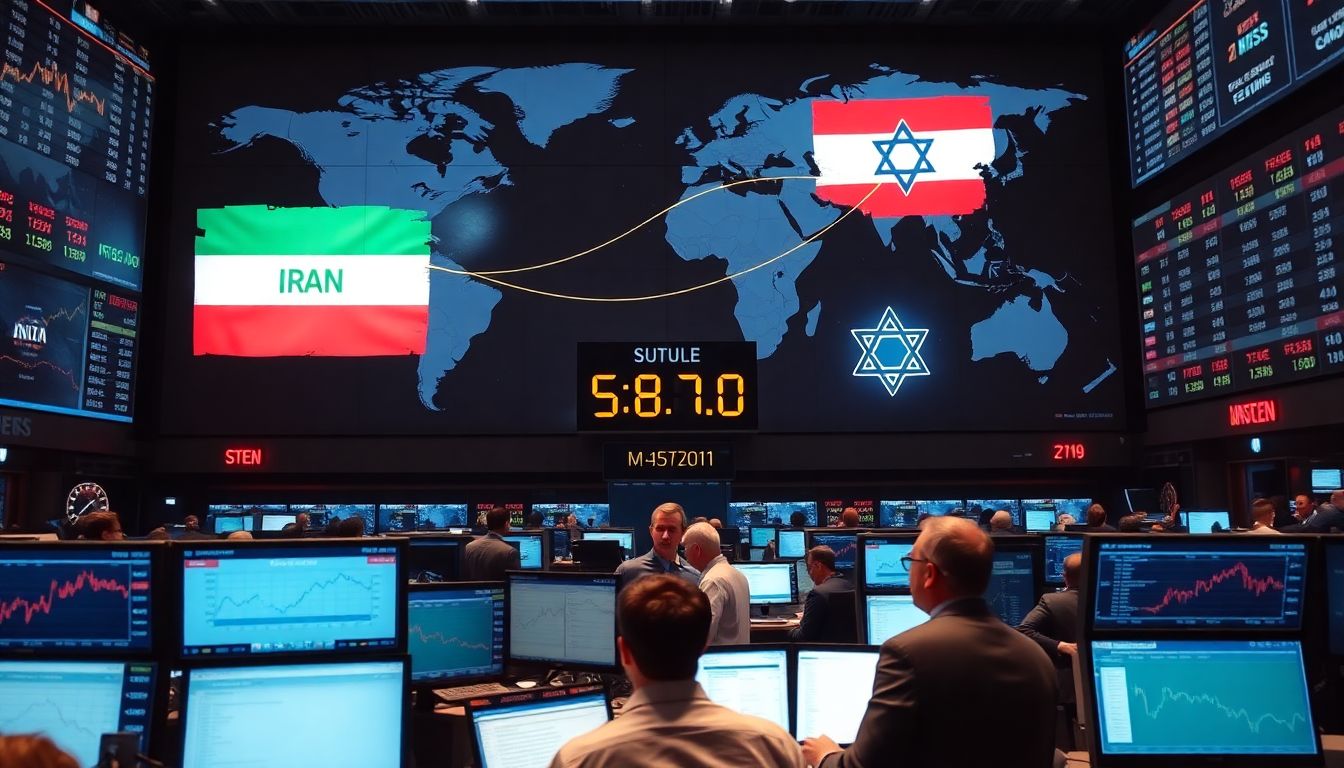
The Impact of the Iran-Israel Conflict on Global and Stock Market Dynamics
Introduction
The Iran-Israel conflict has been a source of tension for decades, but recent flare-ups grab more attention. When these two regional powers clash, it doesn’t stay local. The knock-on effects ripple across global financial markets, shaking investor confidence and changing stock prices. For traders, policymakers, and everyday investors, understanding how these conflicts impact markets is essential to protect assets and make smarter choices.
The Geopolitical Context and Its Market Repercussions
Background of the Iran-Israel Conflict
This ongoing struggle dates back years, fueled by religious, political, and regional tensions. Recently, drone strikes and military skirmishes have increased. Iran’s support for proxies and Israel’s efforts to counter regional threats keep tensions high, causing fears of escalation. These conflicts threaten regional stability, which can influence markets far beyond the Middle East.
How Geopolitical Tensions Influence Financial Markets
When tensions rise, investors view the situation as risky. They tend to pull money out of stocks, especially in vulnerable sectors. Market movements often reflect fear, uncertainty, or optimism based on headlines. Past conflicts, like the Gulf War or US-Iran tensions, showed sharp swings in oil, defense stocks, and currencies. These events prove geopolitical unrest often triggers short-term chaos and long-lasting shifts in markets.
The Role of Middle East Politics in Global Market Stability
The Middle East is a key player in global oil and gas supply. Any disruption can cause oil prices to jump suddenly. That impacts the cost of everything from gasoline to manufacturing goods. Meanwhile, international policies, like sanctions or military support, influence how markets respond. Dependence on Middle Eastern stability links geopolitical events directly to global economic health.
Stock Market Volatility Triggered by Escalating Tensions
Immediate Market Reactions Post-Conflict Escalation
In recent history, periods of heightened Iran-Israel conflict caused a quick rally in oil prices. Defense stocks often surge as countries prepare for possible military action. For example, in 2020, Middle East tensions caused oil futures to spike by over 10% in a single week. Stock indices like the S&P 500 also moved sharply, reflecting investor jitters.
Sector-Specific Impacts
- Energy Sector: Oil prices tend to shoot up when fears of supply disruptions grow. Energy firms see their stocks climb as investors bet on higher profits.
- Defense Industry: Military contractors usually benefit from increased military activity. Stocks like Lockheed Martin or Raytheon tend to rally during escalations.
- Technology and Cybersecurity: Geopolitical unrest can increase demand for cybersecurity solutions. As countries prepare for cyber threats, cybersecurity firms see their shares gain.
Long-Term Market Trends and Uncertainty
The markets don’t settle quickly after conflicts begin. Volatility often persists, especially if tensions escalate or don’t de-escalate fast. Market sentiment indicators show heightened fear during ongoing conflicts, pushing investors toward safer assets. This uncertainty can last for months, affecting investment plans and economic growth.
Economic Consequences of the Iran-Israel Clash
Impact on Crude Oil Prices and Supply Chain Stability
Historical data shows oil prices can double during Middle Eastern conflicts. A disruption in supply chains can start a chain reaction, raising costs everywhere. If conflict spreads, oil exports could face interruptions, sending shockwaves through global markets.
Currency Markets and Exchange Rate Fluctuations
Currencies of regional countries often weaken during conflicts, while safe-haven currencies like the US dollar or Swiss franc tend to strengthen. Sudden exchange rate moves can make imports more expensive and influence international trade.
Inflation, Interest Rates, and Monetary Policy Adjustments
Rising oil prices push inflation higher, forcing central banks to consider rate hikes. Higher rates increase borrowing costs, slowing economic growth. Alternatively, they might cut rates to offset economic slowdown, creating a tug-of-war that complicates monetary policy.
Investor Strategies and Risk Management Amidst Conflict
Diversification and Portfolio Adjustment Strategies
Building a diverse portfolio is your best bet during unstable times. Adding precious metals or global ETFs can help cushion potential losses. Keep an eye on geopolitical risk indexes for early warnings to rebalance your holdings.
Using Derivatives and Hedging Techniques
Options and futures give you tools to hedge against sudden drops. For example, buying put options on stocks or indices can limit losses if markets tumble. Retail investors can work with these instruments to protect their investments without high costs.
Staying Informed with Real-Time Data and Expert Insights
Fast-moving conflicts demand quick decisions. Reliable news sources and geopolitical analysts provide valuable insights. Use alerts and news apps to stay ahead of breaking news, so you can act before markets react wildly.
The Future Outlook and Market Resilience
Potential Scenarios in the Iran-Israel Conflict
A full escalation could trigger a regional war, affecting markets worldwide. A quick de-escalation might bring relief and restore confidence. A prolonged stalemate, however, keeps uncertainty high, keeping markets on edge for months.
Building Resilient Investment Portfolios
Flexibility is key during times of tension. Regularly reviewing your goals and preparing for different scenarios ensures you stay calm and ready. Keep a list of contingency plans and don’t put all your eggs in one basket.
Expert Opinions on Market Stability and Long-term Impact
Many experts believe markets will recover once tensions subside, but volatility could continue in the short term. Diversification and cautious investing are advised. Staying informed and adaptable remain crucial as conflicts unfold.
Conclusion
The Iran-Israel conflict impacts stock markets in many ways, from oil prices to defense stocks. It creates uncertainty that can shake investors’ confidence. Staying alert, diversifying assets, and using timely information are your best tools to face these turbulent times. Remember, markets are often stronger than they seem in the long run, but resilience and caution are key during geopolitical upheaval.
Stay vigilant and adapt your strategies as the conflict evolves—your investments depend on it.







0 Comments